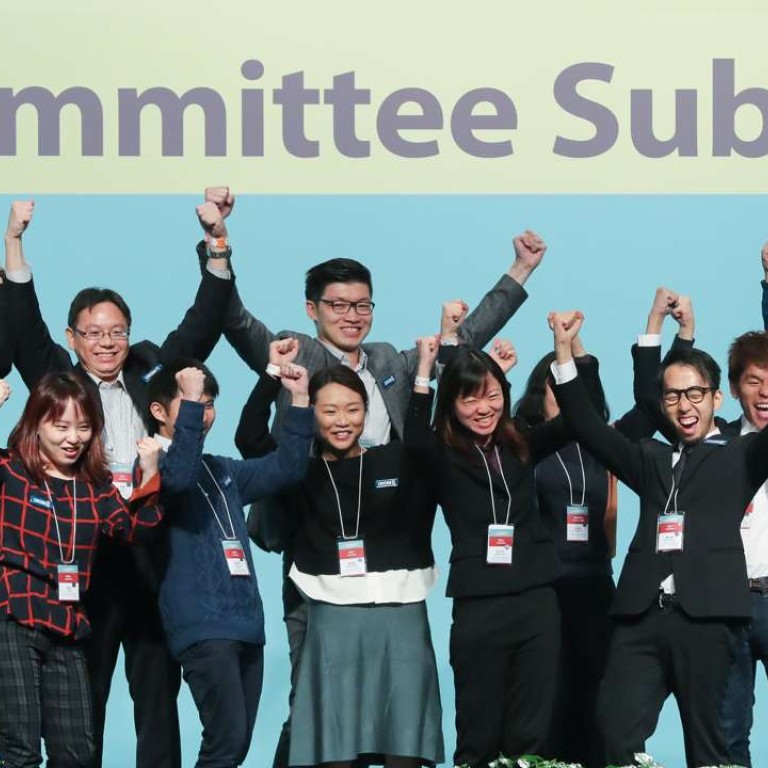
Pan-democrats have tough choices to make ahead of chief executive vote
As the pan-democrats secure 326 seats in the all important Election Committee, their next hurdle will be deciding who to back for chief executive
The pan-democrats have achieved their goal of becoming kingmakers but their new headache will be which king to back and whether it will be a kingdom they can live with.
While some think it would be more politically correct to cast blank votes to delegitimise what they have always criticised as a “small circle election” where only 1,194 members of the Election Committee elect the chief executive, others want a “lesser of two evils” approach to block another hardliner from leading the city.
The dilemma stems from the camp’s almost certain decision to not field their own representative in the chief executive race after previous attempts yielded nothing for them.
In 2012, the camp named then Democratic Party chairman Albert Ho Chun-yan as their man for the top job. He forced the pro-establishment candidates – Leung Chun-ying and Henry Tang Ying-yen – to address questions about the city’s democratic progress on election forums.
But the some 205 pan-democratic committee members eventually failed to make a difference in the election as they either cast blank votes or voted for Ho – who had no chance of winning under the system in which winner must secure at least 601 votes.
The calculations, however, are set to change this year. With the possibility of the pro-establishment camp fielding three candidates and thereby risking splitting the vote, the pan-democrats have never been more powerful.
Chief Secretary Carrie Lam Cheng Yuet-ngor, Financial Secretary John Tsang Chun-wah and New People’s Party chairwoman Regina Ip Lau Suk-yee have all expressed interest in the top job.
Tsang, who announced his resignation yesterday, has cultivated a better relationship with pan-democrats because of his less militant approach compared to the others.
Democratic Party veteran Cheung Man-kwong, a former lawmaker who was returned in the education sector of the Election Committee, agreed it was time to change strategy when it came to the election.
“According to the voters I approached during the campaigning period, it is very apparent that they do not want to see the camp just field yet another candidate to the chief executive race and lose subsequently – it is clearly not their wish this time,” Cheung told the Post. “They hope we could maximise the power of each ballot instead of vowing to cast blank votes from the very beginning.”
Lit Ming-wai from the health services sector also said they would not cast blank votes readily this time.
“We would try our best to stop anyone who would harm Hong Kong from being the chief executive, that includes those who want to relaunch the national security legislation of Article 23,” she said. “We hope every vote could exert its influence.”
The 12-member team of scholars, led by social work academic Dr Petula Ho Sik-ying, which advocated a blank vote movement, were all defeated in the higher education sector.
“How could the environment change so much just two years after the Occupy movement?” she asked, wondering what happened to past strenuous calls to reject restricted political reforms.
The focus had now settled for a lesser goal of the “Anyone but CY” campaign and such “practical thinking has dominated society”, she said.
Some pan-democrats also feared if they endorsed any pro-establishment candidate it would blunt their ability to challenge the chosen leader later.
Accountancy sector lawmaker Kenneth Leung of the Professional Guilds, which coordinated the camp’s effort in the Election Committee polls, admitted it would be a tough task to form a consensus on the voting stance among some 300 members.
His group might hold a meeting next week to invite representatives from the sectors on how to form a coherent strategy.
Echoing the difficulties ahead, Cheung agreed the camp need not rush to endorse anyone yet.
“We do not even know who would officially enter the race now,” said Cheung, referring to the required 150 nominations that every aspirant must first secure. “What we should do now is to explore our biggest common ground … only by staying united could we bring our supporters hope.”

